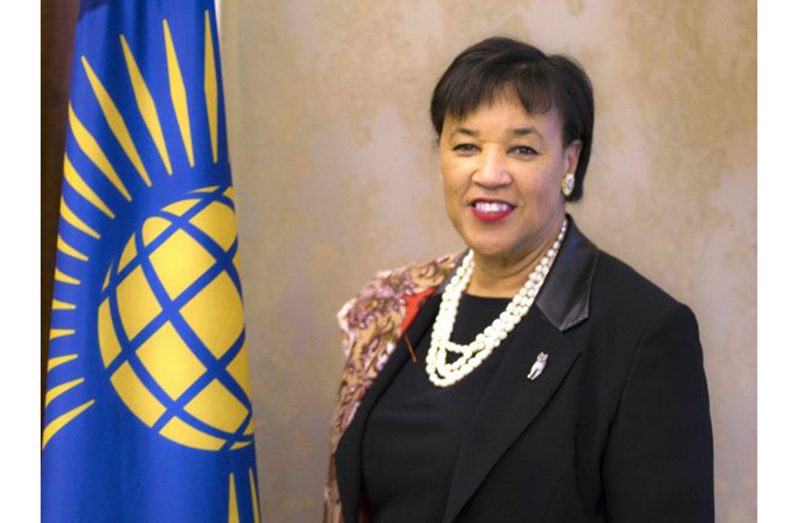— says country’s sovereignty, territorial integrity must be protected
SUPPORT for Guyana in the border controversy with Venezuela continues to grow, with the Commonwealth being the latest international bloc to say that Guyana’s sovereignty and territorial integrity must be safeguarded and maintained.
“The entire Commonwealth family stands in solidarity with the people and Government of the Cooperative Republic of Guyana and in support of a legally binding and peaceful resolution of this controversy,” Commonwealth Secretary-General, Patricia Scotland, QC, said in a statement on Thursday.
The Secretary-General reiterated the Commonwealth’s ‘unequivocal’ support for the maintenance and safeguarding of Guyana’s sovereignty and territorial integrity, in light of Venezuela’s recent claim to the seas and seabed adjacent to the coast west of the Essequibo River.
President of Venezuela, Nicolás Maduro, on January 7, 2021, issued a decree claiming Venezuela’s sovereignty and exclusive sovereign rights in the waters and seabed adjacent to Guyana’s coast, west of the Essequibo River.
Based on reports emanating from Venezuela, the decree points to the creation of a strategic zone for national development called the “Territory for the Development of the Atlantic Façade”, which the Bolivarian Republic envisages will provide adequate protection and safeguard its jurisdiction.
However, since Guyana has sovereign rights over the coast west of the Essequibo River, as far as Punta Playa, it follows, consequently, that only Guyana can enjoy sovereignty and exclusive sovereign rights over the adjacent sea and seabed.
The Commonwealth, according to Scotland, is “deeply concerned” about Venezuela’s promulgation of a decree that seeks to establish that this nation has sovereignty over the area adjacent to ‘Guyana’s’ Essequibo coast, and other recent statements by the country regarding its border controversy with Guyana.
At the 2018 Commonwealth Heads of Government Meeting, Commonwealth Heads committed their full support for the International Court of Justice (ICJ) as the means to be used for the settlement of the controversy between Guyana and Venezuela.
On June 30, 2020, Guyana, in its virtual presentation in the Arbitral Award of October 1899 (Guyana v. Venezuela) case said that not only is Venezuela’s current interpretation of the Geneva Agreement illogical and erroneous, but also in stark contrast to the interpretation the Spanish-speaking country had when it signed the very agreement in February 1966.
Represented by a battery of international lawyers, Guyana said the agreement, in unambiguous terms, empowered the United Nations (UN) Secretary-General to determine an appropriate resolution mechanism to enable a peaceful settlement, which is the ICJ.
FINAL AND BINDING JUDGEMENT
Guyana is seeking to obtain a final and binding judgement that the 1899 Arbitral Award, which established the location of the land boundary between then British Guiana and Venezuela, remains valid, and that the Essequibo region belongs to Guyana, and not Venezuela.
Most recently, the ICJ on December 18, 2020, ruled that it has jurisdiction to hear the Guyana, Venezuela border controversy case.
It was reported that Guyana is confident that the international court will resolve the issue in its favour and that this will also settle the issue of maritime rights in the adjacent sea and seabed. But, under international law, this is now for the ICJ to decide.
At the most recent meeting of the Commonwealth Ministerial Group on Guyana, held on 12 October 2020, the group welcomed the commencement of the ICJ’s proceedings and encouraged both parties in the controversy to participate in this process.
In this regard, the Commonwealth Secretary-General urges that the process now underway at the ICJ must be respected.
This judicial process is one which CARICOM too supports since the regional bloc believes that it is intended to bring a peaceful and definitive end to the long-standing controversy between the two countries.
Both Canada and the United States of America (US) have also called on Venezuela to respect this judicial process.
The Canadian High Commission, in a statement posted on its Facebook page on Monday, stated that Venezuela’s recent claim that it has sovereignty over the area adjacent to Guyana’s Essequibo coast is concerning.
“The decision is in the hands of the International Court of Justice, and this judicial process must be respected,” the High Commission said.
Assistant Secretary (ag) of the US Department of State’s Bureau of Western Hemisphere Affairs, Michael Kozak said, last Sunday, that the US supports the ICJ’s ruling that it has jurisdiction in the Guyana, Venezuela territorial border issue, which is the legal and peaceful way forward.
“Maduro’s aggressive claims don’t change this; they only show the world his disregard for his neighbours and international law,” Kozak asserted in a post on his official Twitter page.
Also, US Ambassador to Guyana, Sarah-Ann Lynch, reiterated the North American country’s call for a legal, peaceful resolution to the border controversy.
“I remind that sovereignty over this coast, and the land territory to which it is attached, were awarded to Guyana (then British Guiana) in the 1899 Arbitral Award, whose validity and legally binding character Guyana is confident the International Court of Justice (ICJ) will uphold unequivocally,” President, Dr. Irfaan Ali affirmed in an address to the nation on Saturday.
He said that regrettably, by decreeing that the seas adjacent to this territory belong to Venezuela, at least two fundamental principles of international law have been violated.



.jpg)








